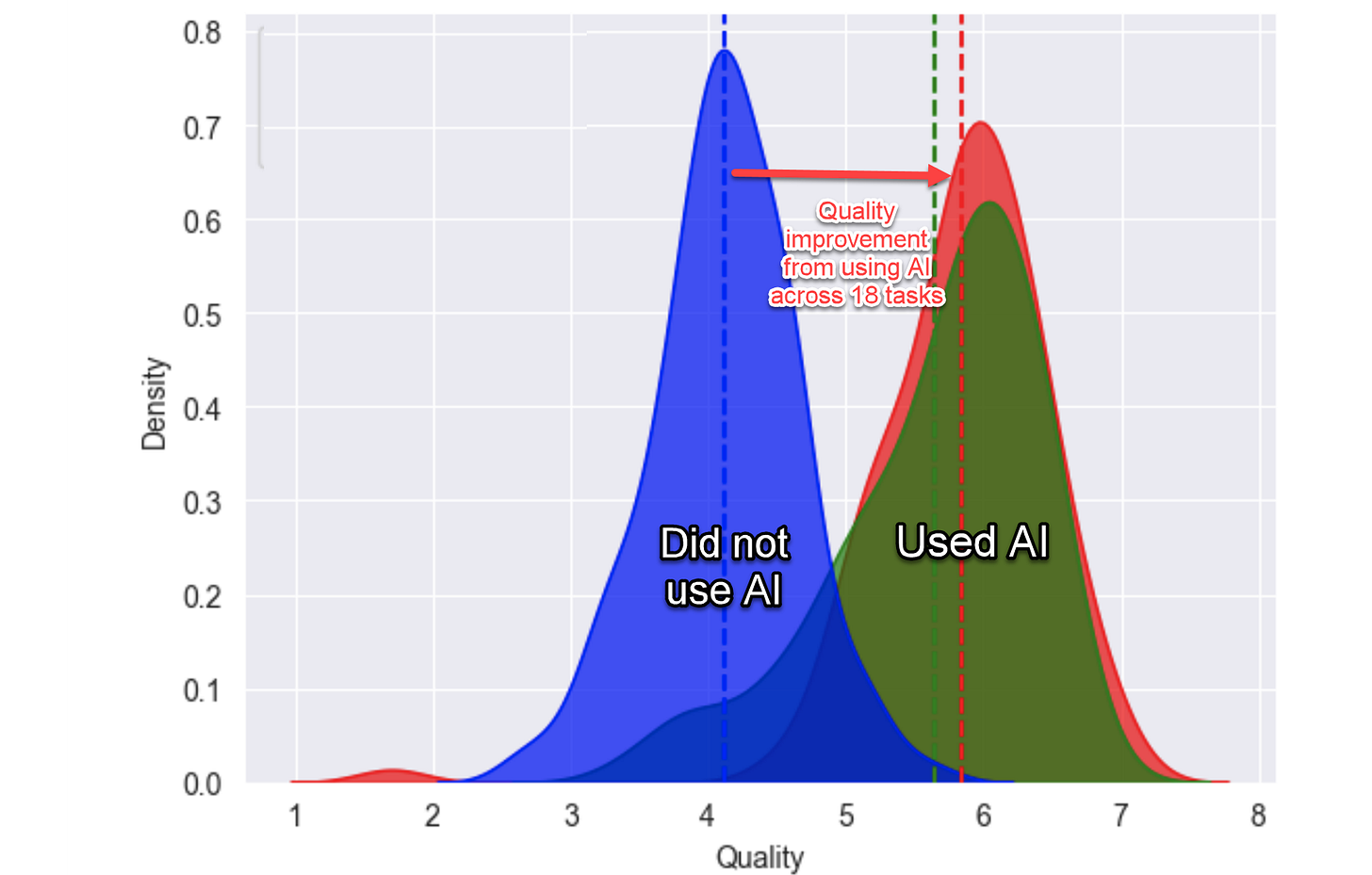20230927
For 18 different tasks selected to be realistic samples of the kinds of work done at an elite consulting company, consultants using ChatGPT-4 outperformed those who did not, by a lot. On every dimension. Consultants using AI finished 12.2% more tasks on average, completed tasks 25.1% more quickly, and produced 40% higher quality results than those without.
Society: New types of partners in China youth. Vertical, digital cemeteries in china. Jailbreaking Lime bikes - clickclick is now part of the sound landscape. 25% of possible caregivers in 2030, France.
People: Skills on Futures studies. Income share agreements.
Security: Nonprofit hacked. FlipperZeros spams iPhones with bluetooth. AutoGPT escaping its container.
AI & Business: AI threatens the billable hour model. New contracts for artists.
DIY: Autonomous Dual-Chatbot System for Research Paper Digesting. Langchain and Neo4j.
Futures of work: Productivity of call center workers improved by 14 percent when using an AI system, with less-skilled staff seeing over 30 percent gains [PDF]. Cyborgs and centaurs for AI@work (original study here - consultants using AI being 25% quicker and 40% better).

Connections in the Age of Algorithms
The coffee shop on the corner of Maple and 5th had always been a hub of creativity, a place where ideas percolated like the espresso shots fired from the machine behind the counter. Today, however, it was hosting an unusual congregation: a group of unassuming twenty-somethings hunched over their laptops, each wearing headphones as if bracing for a storm. They were the latest iteration of "dazi" seekers, not in search of romantic partners, but of something much more elusive—a shared experience in a world increasingly governed by algorithms.
Evelyn, a digital anthropologist and self-proclaimed "dazi" matchmaker, had organized this meet-up, hoping to synthesize the disparate threads of their lives into something coherent. She watched as they typed furiously, the glow of their screens mingling with the amber light of the café. “What’s the point of living if we can’t even agree on a shared interest?” she mused, an eyebrow raised as her fingers danced over her keyboard like a cat playing with a laser pointer.
One of the participants, Ben, a coder with a penchant for existential philosophy, piped up. “You know, I read this study about AI and the future of work. They say that AI will let us become 'Centaur' workers—part human, part machine. But I feel like we’re becoming pieces of a larger algorithm, just cogs in a wheel.” He paused, glancing at the group. “It’s almost like we’re living in a RAG application—Retrieval-Augmented Generation, where our minds are just inputs for a larger narrative.”
“RAG?” said Lucy, a graphic designer who used generative AI to create art. “Is that like a fancy way to say we’re all just data points for someone else's algorithm?” She chuckled, but her eyes held a flicker of uncertainty, as if she were slowly unraveling the implications of her own existence.
Evelyn intervened, “No, no, you’re missing the point. Think of it like this: what if we could use these AI systems to enhance our creative outputs? Like the LangChain library integrating with Neo4j to generate more meaningful connections from our data.” She grinned, fully aware that she had just invoked the most pretentious analogy imaginable, but it was too late now. The coffee was strong, and the direction of the conversation had taken a turn into the abstract.
Suddenly, the café’s Wi-Fi flickered, and a digital pop-up appeared on their screens, courtesy of the nearby hackers employing their “Flipper Zero” devices. “Bluetooth advertising assault,” someone muttered, and everyone groaned. The irony was thick enough to slice with a butter knife. It was as if the universe were mocking their quest for authenticity by reminding them that their very tools of connection could be weaponized by the digital underbelly of society.
Within moments, their screens were flooded with messages, a cacophony of notifications that drowned out their hopes for meaningful interaction. It was a stark reminder that while they sought companionship in a world gone digital, the very fabric of that world could be frayed by the machinations of others.
Just then, the door swung open, letting in a gust of autumn air that carried a hint of change. An elderly man entered, wearing a tattered coat with a sign that read, “Will code for companionship.” He scanned the room and, with a bemused smile, approached the group. “I hear you’re looking for shared interests. How about we start with the fine art of not being hacked?”
And as the group burst into laughter, they realized that perhaps the most genuine connections could still be forged amidst the chaos of technology. In a world where identities were curated and connections were quantified, the simple act of sharing a joke became their most rebellious act yet.
*Footnote: “RAG” could also stand for “Really Awkward Gathering,” which, considering the Wi-Fi incident, might just be the most accurate descriptor.*

